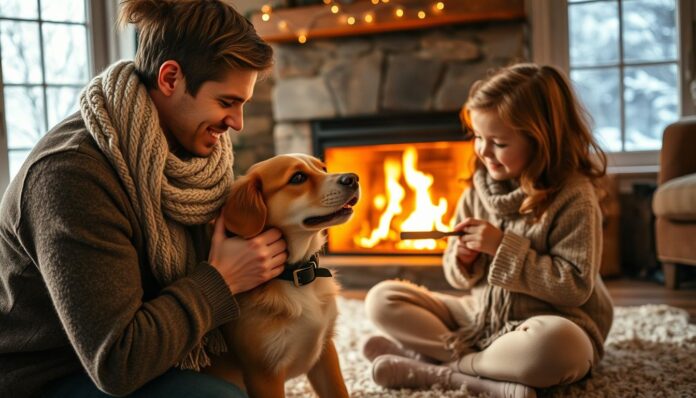As winter comes, you want to keep your pets safe and cozy. Winter pet care is key to stop illnesses and injuries from cold weather. The American Animal Hospital Association says winter can be tough for pets, with dangers like hypothermia, frostbite, and dehydration.
It’s important to care for your pets well in winter. This means keeping them warm and safe from cold. By doing this, you can avoid health problems caused by cold weather.
Knowing the dangers of cold weather and protecting your pets is vital. In this article, we’ll share important tips to keep your pets safe this winter. We’ll talk about understanding winter risks, keeping them safe indoors, and making sure they’re safe outside.
Key Takeaways
- Winter pet care is crucial to prevent illnesses and injuries associated with cold weather
- Prioritizing pet safety is essential to protect your pets from the harsh effects of cold weather
- Limiting exposure to cold weather and providing a warm and comfortable place to rest is vital
- Understanding the risks associated with cold weather can help you take steps to protect your pets
- Providing indoor protection and outdoor safety measures can help ensure your pets’ overall health and well-being
- By following essential winter pet care guidelines, you can help keep your pets safe and comfortable during the winter months
- Winter pet care is an essential part of responsible pet ownership and can help strengthen the bond between you and your pets
Understanding Winter Risks for Your Pets
As a pet owner, knowing about winter hazards is key. Frostbite, hypothermia, and dehydration can be deadly. The American Veterinary Medical Association warns about these dangers, saying they’re common in pets exposed to cold for too long.
Winter can be very dangerous for pets. Frostbite happens when pets get too cold, damaging their skin and tissues. Hypothermia occurs when pets get too cold, showing signs like shivering and confusion. It’s vital to protect your pets from these risks.
Some common winter hazards for pets include:
- Frostbite: caused by prolonged exposure to cold temperatures
- Hypothermia: caused by a drop in body temperature
- Dehydration: caused by inadequate access to fresh water
To keep your pets safe, provide shelter and fresh water. Watch for signs of frostbite or hypothermia. Remember, winter dangers are serious, so protect your pet’s health.

Essential Winter Pet Care Guidelines
As a pet owner, you are key to your pet’s winter health. A balanced diet is crucial, as pets need more calories to stay warm. The National Research Council suggests a diet that meets their nutritional needs. This is vital for their pet nutrition.
To keep pets healthy and warm, focus on hydration and nutrition. Here are some important guidelines:
- Watch your pet’s food and water intake, as they may need more calories to stay warm.
- Make sure they always have access to fresh water to avoid dehydration.
- Give them a nutritious diet with essential vitamins and minerals to keep them healthy and warm.
By following these tips, you can help your pet stay healthy and warm this winter. Always talk to your vet for advice on caring for your pet during the cold months.
Indoor Protection and Comfort Measures
To keep your pets safe and comfortable in winter, focus on indoor protection and comfort. A warm environment is key to prevent cold illnesses and keep pets cozy. The Humane Society suggests a warm, comfy spot for pets to sleep, like a dog bed or blanket.
Creating a warm, cozy space for pets includes using space heaters or heated beds. Make sure your home is well-insulated to block cold drafts. Also, keep pets away from cold surfaces and provide a warm place to rest.
Here are some tips for indoor protection and comfort:
- Provide a warm and comfortable place to sleep, such as a dog bed or blanket
- Use space heaters or heated beds to provide extra warmth
- Ensure that your home is well-insulated to prevent cold drafts
- Keep your pets away from cold surfaces, such as tile or concrete floors
By following these tips, you can create a warm space that prioritizes your pets’ safety and comfort. This ensures they stay safe and cozy all winter.
Outdoor Safety and Exercise Solutions
As a pet owner, it’s key to give your pets pet exercise and mental fun in winter. The American Kennel Club says to take them for short walks, play indoor games, or use interactive toys. Make sure they’re safe and cozy by dressing them in coats or booties to keep their paws warm.
Some safe outdoor activities for pets include:
- Short walks on cleared paths
- Playtime in fenced-in areas
- Snowplay, such as building snowmen or having snowball fights
For outdoor safety, consider these tips:
- Keep your pets on a leash to prevent them from running off
- Avoid areas with frozen lakes or rivers, as the ice may be thin
- Provide your pets with plenty of water and snacks to keep them energized
Always put your pets’ safety and comfort first when doing winter activities. With a bit of creativity, you can keep your pets happy and healthy all winter.
Conclusion: Ensuring Year-Round Pet Wellness
Keeping your pets healthy all year is key. Understanding their winter pet care needs is important. This helps them stay safe and cozy when it’s cold.
Regular vet visits are a must. They help catch health problems early. This way, your pets can stay healthy and happy.
By following the advice in this article, you can keep your pets well all year. Their pet wellness is crucial. With your care, they’ll be happy and healthy at home, no matter the season.
FAQ
What are the common winter hazards for pets?
Winter can be tough on pets. They might get frostbite, hypothermia, or dehydration. Frostbite happens when their skin gets too cold. Hypothermia is when their body temperature drops too low.
Dehydration is also a risk. Pets might drink less water in the cold.
How can I provide a warm and comfortable environment for my pet indoors?
Make your pet’s indoor space cozy. Give them a warm place to sleep, like a dog bed. Keep your home well-insulated to block cold drafts.
Use space heaters or heated beds for extra warmth. But, don’t let your pet sleep on cold floors.
How can I ensure my pet’s outdoor safety and provide exercise during the winter?
For outdoor safety, take short walks with your pet. Dress them in a coat and booties to protect their paws. Indoor activities like agility training can also keep them active.
Regular exercise helps prevent boredom and stress in winter.
How can I ensure my pet’s overall health and wellness year-round?
Regular check-ups and preventative care are key. This includes vaccinations, parasite prevention, and dental care. A balanced diet and enough water are also crucial.
These steps help keep your pet healthy all year.
How can I ensure my pet’s nutrition needs are met during the winter?
Pets might need more calories to stay warm in winter. Feed them a balanced diet with essential vitamins and minerals. Watch their food and water intake to meet their needs.
For more health tips and wellness advice, explore Negony.com and discover valuable insights to help you live a healthier, happier life.



























